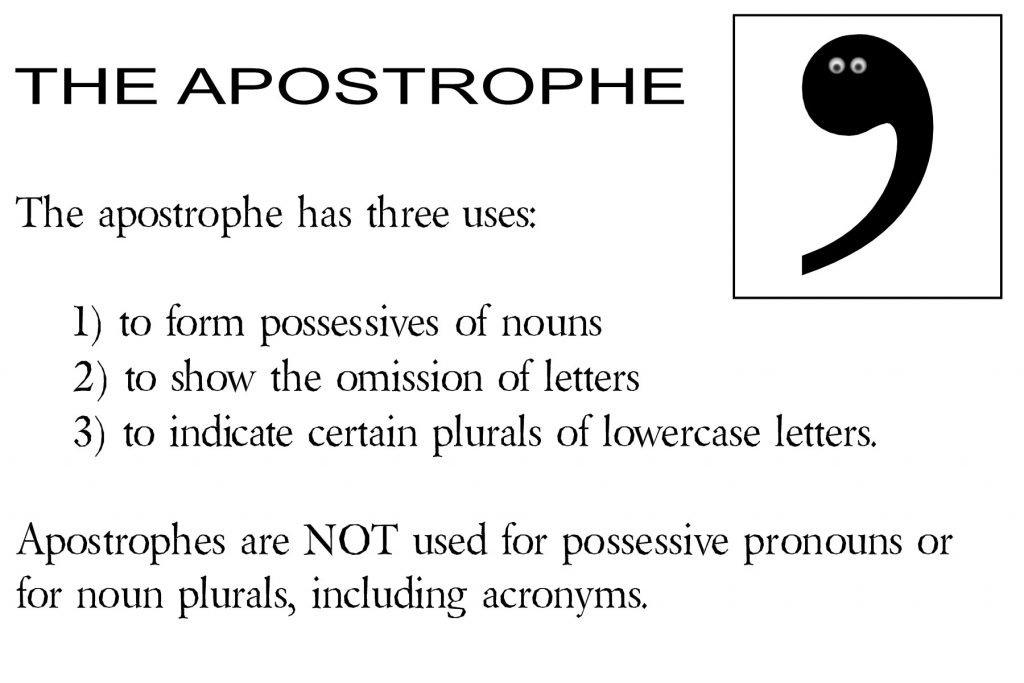Many people know what an apostrophe looks like. In case you do not, here is Exhibit A –

This is some useful information I found on how to use it –

You may be wondering how on earth my brain worked to choose this word for #WordWednesdayFun? Or, maybe not? 🙂 I was reading a thread on one of my favorite Facebook writer group pages. This is an excerpt from the chatter:
Ok, all you grammar fascists, please help me out.
He went to the dentist’s place. ie. he went to the place belonging to the dentist. So far, ok?
So the same would apply to the butcher, baker, or candlestick maker. So what if we drop the place?
He went to the dentists, or, he went to the dentist’s. ???? (the place or shop being assumed.) Any help appreciated.
Me being me, I could not resist joining in this convo:
Me: If you are from the UK, you would say in everyday conversation “I am going to the dentist’s.” Most Brits would not say “I am going to the dentist.” Or at least most Brits from certain regions of the UK.
This comment of mine attracted other contributors:
Reply · 6 hrs
Gene Ostenkamp
Gene Ostenkamp I am from Ohio, and adding the s at end is common…going to the dentist’s, or going to the doctor’s, etc.
Unlike · Reply · 1 · 6 hrs
Steve Bentley
Steve Bentley I having something in common with Ohions 🙂
Like · Reply · 1 · 5 hrs · Edited
Christeen George
Christeen George I’m British and I would say I’m going to the dentist but would say I’m going to the doctor’s.
Unlike · Reply · 2 · 4 hrs · Edited
Steve Bentley
Steve Bentley Christeen George you must be posh 🙂
Like · Reply · 3 mins
All good harmless fun about an abstract point. Let’s see what Merriam-Webster has to say about the word –
noun apos·tro·phe \ə-ˈpäs-trə-(ˌ)fē\
Popularity: Bottom 50% of words
Definition
: the addressing of a usually absent person or a usually personified thing rhetorically <Carlyle’s “O Liberty, what things are done in thy name!” is an example of apostrophe>
apostrophicplay \ˌa-pə-ˈsträ-fik\ adjectiveDefinition
: a mark ‘ used to indicate the omission of letters or figures, the possessive case, or the plural of letters or figures
apostrophic adjectiveOrigin and Etymology
French & Late Latin; French, from Late Latin apostrophus, from Greek apostrophos, from apostrophos turned away, from apostrepheinFirst Known Use: 1727
Definition of apostrophe for Students
: a mark ‘ used to show that letters or figures are missing (as in “can’t” for “cannot” or “’76” for “1776”) or to show the possessive case (as in “Mike’s”) or the plural of letters or figures (as in “cross your t’s”)
Let us now see the M-W Facebook entry for this page:
Emily Erin
I’m teaching on the subject and wanted the correct definition.
Like · Reply · Jan 8, 2016 3:38am
Well done, Emily! “I’m,” indicating a missing ‘a.’ 🙂
‘T’is a wonderful thing, this English language!
Follow Me On Social Media

Well, then there’s the poetic technique called “apostrophe”: addressing an absent or abstract personage. E.g., “Death, be not proud” (John Donne). I’m sure he uses the punctuation form of “apostrophe” in the sonnet, though I think debates about that poem have focused on other punctuation like commas and semicolons. Sounds pedantic, I know. But there’s a whole scene in the movie “Wit” (starring Emma Thompson) where a professor rejects a student’s paper because she used the edition of “Death Be Not Proud” that contained a semicolon, and not a comma. Yikes.
Yikes! Indeed! I am only too aware of the ‘grammar police’!